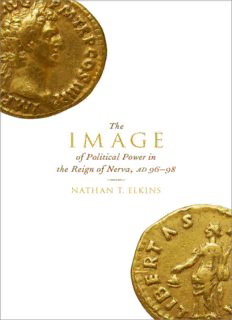
The image of political power in the reign of Nerva, AD 96-98 PDF
Preview The image of political power in the reign of Nerva, AD 96-98
The Image of Political Power in the Reign of Nerva, ad 96– 98 T he Image of Political Power in the Reign of Nerva, ad 96– 98 Nathan T. Elkins 1 1 Oxford University Press is a department of the University of Oxford. It furthers the University’s objective of excellence in research, scholarship, and education by publishing worldwide. Oxford is a registered trade mark of Oxford University Press in the UK and certain other countries. Published in the United States of America by Oxford University Press 198 Madison Avenue, New York, NY 10016, United States of America. © Nathan T. Elkins 2017 All rights reserved. No part of this publication may be reproduced, stored in a retrieval system, or transmitted, in any form or by any means, without the prior permission in writing of Oxford University Press, or as expressly permitted by law, by license, or under terms agreed with the appropriate reproduction rights organization. Inquiries concerning reproduction outside the scope of the above should be sent to the Rights Department, Oxford University Press, at the address above. You must not circulate this work in any other form and you must impose this same condition on any acquirer. CIP data is on file at the Library of Congress ISBN 978– 0– 19– 064803– 9 9 8 7 6 5 4 3 2 1 Printed by Sheridan Books, Inc., United States of America Divo Nervae CONTENTS Preface ix Abbreviations xv Introduction: The Power of Images in the Reign of Nerva 1 CHAPTER 1 Nerva as Supreme Military Commander 24 CHAPTER 2 Nerva, the Senate and People of Rome, and Italy 52 CHAPTER 3 Nerva and the Roman Empire 102 Conclusion: The Visualization of Political Rhetoric 137 Appendix 1. The Typological Makeup of Nerva’s Imperial Coin Emissions 155 Appendix 2. Nerva’s Coin Types and Their Dates of Production 161 Appendix 3. The Relative Frequencies of Denarius Types by Emission 165 Appendix 4. Identifiable Base- Metal Coins and Their Regional Distribution: Hoards and Excavations 175 Bibliography 181 Index 201 PREFACE Nerva rose to power at the end of the Flavian dynasty as the thirteenth Caesar. He ruled for less than a year and a half; his administration experienced tensions with the armed forces, since the common soldiery had great affection for their assassinated emperor, Domitian. As there is little art that survives from his reign, study of Nerva’s principate has been the province of historians who examine sources written after he died that attest to the troubles his administration encountered and the circum- stances through which Trajan was ultimately named his heir. The impe- rial coinage is, however, the most complete record of art from Nerva’s reign. Unfortunately, it has been mishandled and treated as a historical text rather than a state-s anctioned product that necessarily presented the living emperor in a positive light and, in so doing, reflected contemporary political rhetoric (as illuminated by the “praise and blame” literature of the day) that exalted Nerva in the aftermath of Domitian’s fall. In textbooks on Roman art, Nerva affords only cursory treatment, as his reign left little that is monumental. Even in surveys of Roman coinage, Nerva is easily overlooked. For example, in The Oxford Handbook of Greek and Roman Coinage (Oxford University Press, 2012), Nerva’s imperial coinage is omitted entirely, although there are contributions dedicated exclusively to the Flavians and to Trajan and Hadrian. It is time that Nerva is given his due and that his image of political power as it was projected during his lifetime is brought to light. The idea for this book had its genesis in Frankfurt am Main, Germany, between 2007 and 2009. The Goethe Universität is a center for devel- oping methods in the study of coin finds and I learned much from my
Description: